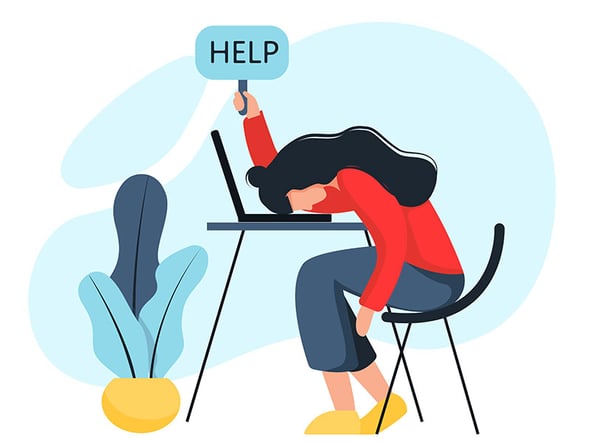In this article guest author Dr. Laurie Hazard shares her views to support students and deliver effective First-Year-Experience programs on campus. For more FYE resources, check out some of our recent webinars, including 'Mastering Executive Functioning Skills: A Key To Academic Success' featuring Dr. Hazard.
You may have heard the expression, “Procrastination is the assassination of motivation.” When college students hear this, initially, they may find it humorous. They get it. At one time or another, they have found themselves in situations where procrastination has rendered them immobile and helpless. At the same time, they recognize the importance of addressing their procrastination. If left unattended, it has the potential to adversely impact their success in classes—an experience firsthand for some.
Indeed, countless first-years will admit to feeling unmotivated at times, needing help with time management, and struggling with procrastination. In other words, they need support with their self-regulatory behaviors. After seeking support, many well-intentioned students follow the advice of student success professionals. They create semester schedules, daily plans, to-do lists, and may even design elaborate time management systems. Unfortunately, some still have difficulty meeting their academic goals. Consequently, they become frustrated, wonder why their system isn’t working, and give up. Why is this? Despite learning about effective time management and goal-setting practices, many students fail to apply them in reality. For instance, while they understand the principles of time management, such as using a planner and setting goals, they often struggle with following through and completing the tasks they've planned. To begin the process of getting a handle on these self-regulatory behaviors, students should consider the well-documented consequences of procrastination.
Not surprisingly, procrastinators begin studying significantly later, resulting in fewer total study hours (Lay & Burns, 1991). Obviously, less time spent studying results in lower grades and less learning. This research flies in the face of the procrastinators’ common mantra. “I work well under pressure.” What they are really saying is that the work gets done despite having been repeatedly put off. While that may be true, completing their work doesn’t mean that it was done well.
Procrastination has serious consequences beyond academics
Procrastination has serious consequences beyond academics. A leading expert on procrastination says that health is another cost. His research found that over a single term, procrastinators exhibited compromised immune systems such as more colds, flues, gastrointestinal problems, and insomnia. The research also points out the negative effects of procrastination on relationships. Procrastination may shift the burden of responsibilities onto others, who become resentful (Marano, 2007). Imagine a group project with a procrastinator. One of the most detrimental side effects of procrastination is higher levels of alcohol consumption. Procrastinators tend to drink more as an avoidant behavior, replacing academic work with the negative coping activity of drinking (Marano, 2003).
Procrastination is a difficult habit to kick. There is a deceptive component to this behavior. When you procrastinate, you put yourself in the position of lying to yourself and others. Many professors report that students lie to them when it comes time to take a test or turn in a paper or project. At these times, it seems an inordinate number of relatives are dying, cars are having mechanical problems, and computers are crashing. Is it merely a coincidence that natural deaths, dead car batteries, and computer viruses are on the rise during exam time or around due dates posted on a syllabus? Such excuses indicate that students have procrastinated and need to lie themselves out of the situations they have created. The good news is students can change this behavior and become more productive if they are willing to reflect on and understand their own procrastination behaviors, and if they try out some concrete strategies.
There are a number of tips that can help students get moving. First, students need to think differently about the idea of time management. Second, they need to distinguish between wants and needs. Third, they should learn about the concept of “time on task.” Next, they must address their self-deceptive thoughts and behaviors. Finally, they should identify their replacement activities and consider finding an accountability partner.

Think Differently About Time Management
Consider this scenario: Arielle has her day planned out to the tee. After her classes, she has tennis practice from three to five p.m. Following a thirty-minute relaxation period, she plans to have dinner with her roommate. Then, she intends to head to the study lounge to read biology from 6:30 to 7:30 pm. It's evident that Arielle is in control of her time. Now, let's reflect on what happens next.
From 6:30 to 7:30 p.m., Arielle intends to read a biology chapter. While immersed in the intricacies of photosynthesis, her smartphone notifications interrupt her. Pausing momentarily, she discovers messages from her aunt, a neighbor from home, and a few friends. Twenty minutes slip away as she scrolls through Facebook, Instagram, and Snapchat. Returning to her biology reading, another notification appears—this time from her boyfriend. After a brief exchange, she realizes it's 9:30 p.m. Closing her biology text in frustration, she must now forego the reading to focus on a paper due tomorrow.
Arielle might believe she knows how to manage her time, as each time block was planned out very precisely throughout her day. However, what Arielle did not do well is manage her behavior during those time blocks. Students facing similar situations can improve their ability to achieve academic goals by shifting their mindset from focusing solely on managing time to managing behavior. For many, the distinction between time management and behavior management is crucial. As the old expression goes, 'you can't change time.' There are only sixty minutes in an hour. What students can change, however, is their ability to manage their behavior more effectively.
Distinguish Wants and Needs
Managing behavior is a question of self-regulation. Arielle faces important decisions, such as, 'Should I disrupt my study plan if my cell phone notifications start?' When confronted with these decisions, it's helpful to consider wants versus needs. While Arielle may have wanted to text her boyfriend, did she need to do so at that very moment? Instead, Arielle could have thought about texting her boyfriend as a reward for reaching her academic goal—'After I finish my biology chapter, then I’ll text him.' This mindset requires a bit of self-discipline: work first, leisure after. Nearly every human being procrastinates; it’s a matter of degree. Delaying gratification or restraining our impulses is challenging. It’s far easier to prioritize fun. Some of us have difficulty delaying gratification, while others are more adept at putting work before fun. Self-disciplined people find ways to prioritize work first and then have fun. In short, they are good at managing their behavior.
First-year students often have difficulty figuring out exactly how to allocate their time.
Consider Time on Task
One of the reasons behavior management presents challenges for first-year students is the difficulty of figuring out exactly how to allocate their time. In tuning into the idea of behavior management, new students will have to consider time on task. It may not be that they don’t know how to manage their time; rather, what might be producing frustration is an inability to predict time on task accurately in the new learning environment of college.
Let's return to Arielle. It is now late, and she still needs to write a paper. Similar assignments in high school would typically take Arielle about two hours to complete. As she tackles the assignment, she realizes that she has to reread a few articles. She thinks to herself, “What does this title even mean?” Rereading the article carefully enough to write about it takes Arielle two and a half hours. Past midnight, and she hasn’t even started her draft. Tired and defeated, she thinks, “This time management strategy stinks! It’s obviously not working for me... argh.”
Arielle’s situation clearly illustrates that even the most organized students with the best intentions may experience frustration with time management practices when they begin college. To overcome these frustrations, they will need to make adjustments to how they think about time management and be honest with themselves about the practicality of their plans.

Address Self-Deception
Identifying a lie you’ve told to another person is a lot easier than figuring out when you are lying to yourself. Experts estimate that most people lie at least twenty-five times in a single day! While it may be obvious when you’ve lied to someone else, how do you recognize if you are lying to yourself? One of the keys to combating procrastination is being aware of your patterns of deception. Experts identify three broad categories for why people lie: to make others feel better about themselves—‘No, that outfit doesn’t make you look fat’; to boast about ourselves and make ourselves look better—‘I didn’t even crack that book, and still got an A on the exam’; or to protect ourselves—‘I don’t feel like studying right now; I’ll start after dinner.’ The third type of lie has the greatest influence on procrastination behavior. When we lack motivation to study, we may convince ourselves that it's okay to start later, like after dinner, as a way to protect against facing the work that has piled up. Procrastinators sabotage themselves by saying, “I’ll feel more like doing this tomorrow;”
Many college students claim they are particularly motivated to get their schoolwork done when they are under pressure. These students often say, “I do my best work when I am under pressure, like the night before my paper is due.” This is a common credo of the procrastinator and perhaps the biggest lie students tell themselves. Leading experts say that about twenty percent of people identify themselves as chronic procrastinators (Marano, 2003). If you think you fall into this statistic and have uttered the die-hard procrastinator’s credo, you may want to tune in more closely to your “self-talk”—the lies you tell yourself, such as, “I’m just going to watch a few TikToks.”
Identify Your Replacement Activities
As mentioned, there are often activities that replace your priorities. Some can be unhealthy, like drinking too much to cope. Others aren’t as serious or detrimental. Most are quite easy to identify; these usually include obvious distractions such as binge-watching Netflix, playing video games, engaging in social media, or hanging out with friends—activities that students often favor. However, it can be challenging to recognize other types of replacement activities because they are often masked by a semblance of productivity. For instance, tasks like doing laundry, washing dishes, cleaning your room, going to the bank, or paying monthly bills are important and necessary, but are they priorities relative to your studies?
Students often engage in seemingly productive activities, such as doing laundry, to avoid more critical tasks, like reading a chapter due the following day. By accomplishing these smaller tasks, they create a sense of achievement and can cross “laundry” off their to-do list, making themselves feel better. Engaging in such activities gives the illusion of productivity, but in reality, they are sidestepping their top priorities. These individuals are known as productive procrastinators. They may dedicate time to cleaning their rooms, a noble activity, only to realize one or two hours later that they've unwittingly squandered precious homework time. This aspect of procrastination's deceptive nature is why it can be challenging to identify. It's important for students to recognize that they are not alone in this struggle, as many students grapple with combating procrastination.

Find An Accountability Partner
Sometimes, students lack the “stick-to-it-iveness” to follow through on the goals they have recorded in their planners. Holding oneself accountable can be challenging. Given that most students face similar challenges, it is recommended that they consider partnering with another student. Ideally, they could find an accountability partner who is in a few of the same classes. Together, they can share their goals, plan library sessions, and mutually motivate each other along the way. Psychologists term this social support. Social support plays a crucial role in facilitating behavior change. There are two types of social support: emotional and informational. Emotional support involves empathy, where students understand and encourage their classmates. Informational support consists of advice, suggestions, and sharing information. For instance, an accountability partner might offer a helpful study tip or guide their partner to a campus resource. Even better, they could use a campus resource, such as tutoring, together.
You may have heard the expression, “procrastinators recruit others to procrastinate with them.” Why? Misery loves company. There are instances where students apply peer pressure and sabotage their classmates' plans by encouraging them to “blow off” schoolwork. Have you experienced this scenario? Were you the one sabotaged, or did you act as the saboteur? It's crucial for students to surround themselves with peers who are productive, high-achieving, and supportive of their dreams and aspirations. In short, students should seek out accountability partners they can rely on.
Combating procrastination necessitates deep reflection on thought patterns and the establishment of effective behaviors and habits.
Conclusion
Procrastination is a complex behavior. Combating procrastination necessitates deep reflection on thought patterns and the establishment of effective behaviors and habits. While students can learn about self-regulatory behaviors and strategies, being consistently productive requires starting by acknowledging the difference between knowing what those strategies are and knowing how to apply them—actually enacting the strategies in a habitual way. While these five tips are not exhaustive by any means, they have the potential to get procrastinators moving.
About the Author
Dr. Laurie L. Hazard, Ed.D.
Founder, Recognize Your Potential
Educator, Counselor, Student Success Expert
www.lauriehazard.com
www.Offtoseries.com
Laurie Hazard is an award-winning educator and nationally recognized student success expert who researches how students make successful transitions from secondary to higher education. She studies and writes about student personality types, academic achievement, and classroom success. For more information on Laurie's speaking, writing, and consulting: www.lauriehazard.com.
Credits
- Hazard, Laurie and Jean-Paul Nadeau. Foundations for Learning, Third Edition, Prentice-Hall, 2012
- Lay, C., & Burns, P. (1991). Intentions and behavior in studying for an examination: The role of trust procrastination and its interaction with optimism. Journal of Social Behavior and Personality, 6, 605–617.
- Marano, H. E. (2003) Procrastination: Ten things to know. Psychology Today, retrieved May 14, 2010, from psychologytoday.com.
- Marano, H. E. (2003) Why we procrastinate. Psychology Today, retrieved May 14, 2010, from psychologytoday.com.
